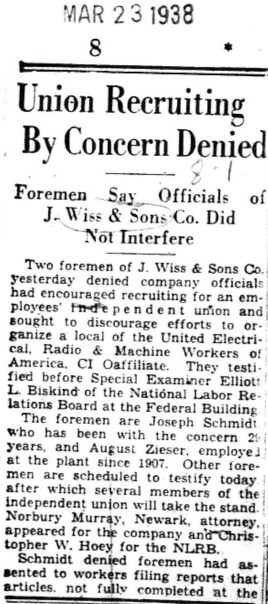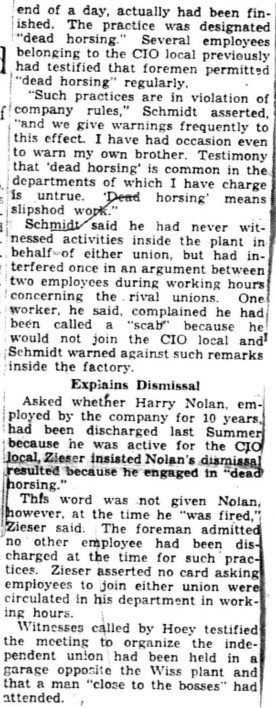

The foremen are Joseph Schmidt who has been with the concern 2 years, and August Zieser, employee at the plant since 1907. Other foremen are scheduled to testify today after which several members of the independent union will take the stand. Norbury Murray, Newark, attorney, appeared for the company and Christopher W. Hoey for the NLRB.
Schmidt denied foremen had assented to workers filing reports that articles, not fully completed at the end of a day, actually had been finished. The practice was designated "dead horsing." Several employees belonging to the CIO local previously had testified that foremen permitted "dead horsing" regularly.
"Such practices are in violation of company rules," Schmidt asserted, "and we give warnings frequently to this effect. I have had occasion even to warn my own brother. Testimony that 'dead horsing' is common in the departments of which I have charge is untrue. 'Dead horsing' means slipshod work."
Schmidt said he had never witnessed activities inside the plant in behalf of either union, but had interfered once in an argument between two employees during working hours concerning the rival unions. One worker, he said, complained he had been called a "scab" because he would not join the CIO local and Schmidt warned against such remarks inside the factory.
Asked whether Harry Nolan, employed by the company for 10 years, had been discharged last Summer because he was active for the CIO local, Zieser insisted Nolan's dismissal resulted because he engaged in "dead horsing."
This word was not given Nolan, however, at the time he "was fired," Zieser said. The foreman admitted no other employee had been discharged at the time for such practices. Zieser asserted no card asking employees to join either union were circulated in his department in working hours.
Witnesses called by Hoey testified the meeting to organize the independent union had been held in a garage opposite the Wiss plant and that a man "close to the bosses" had attended.